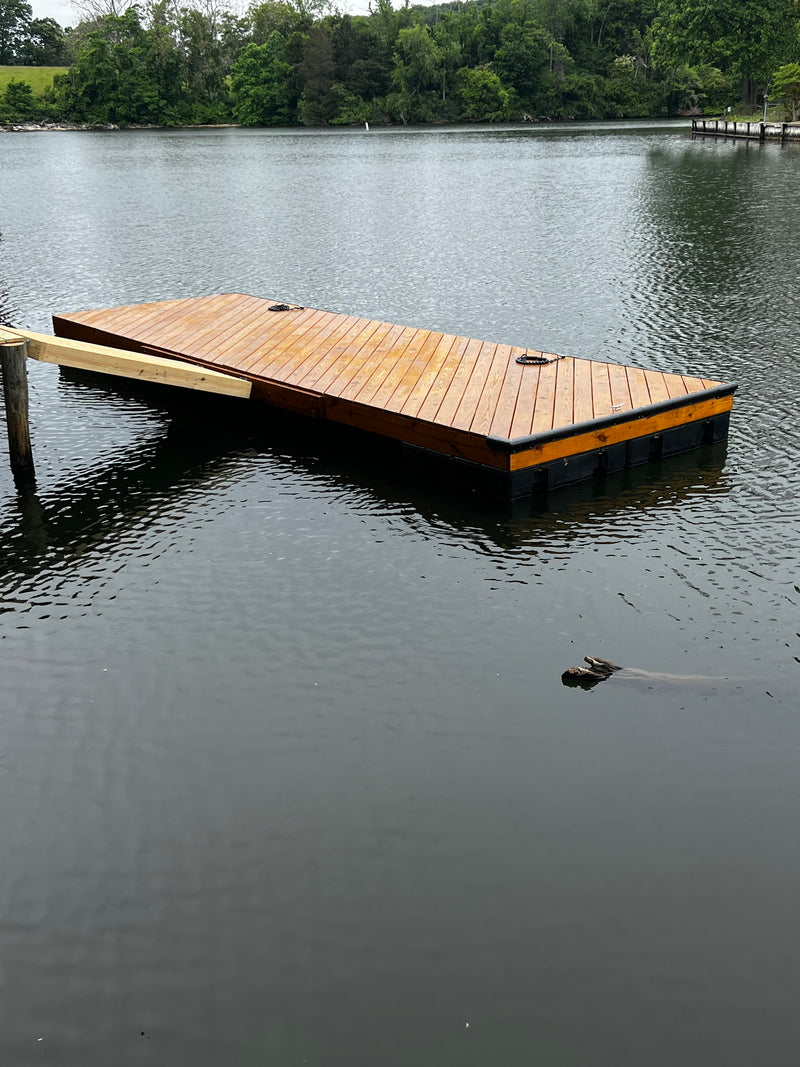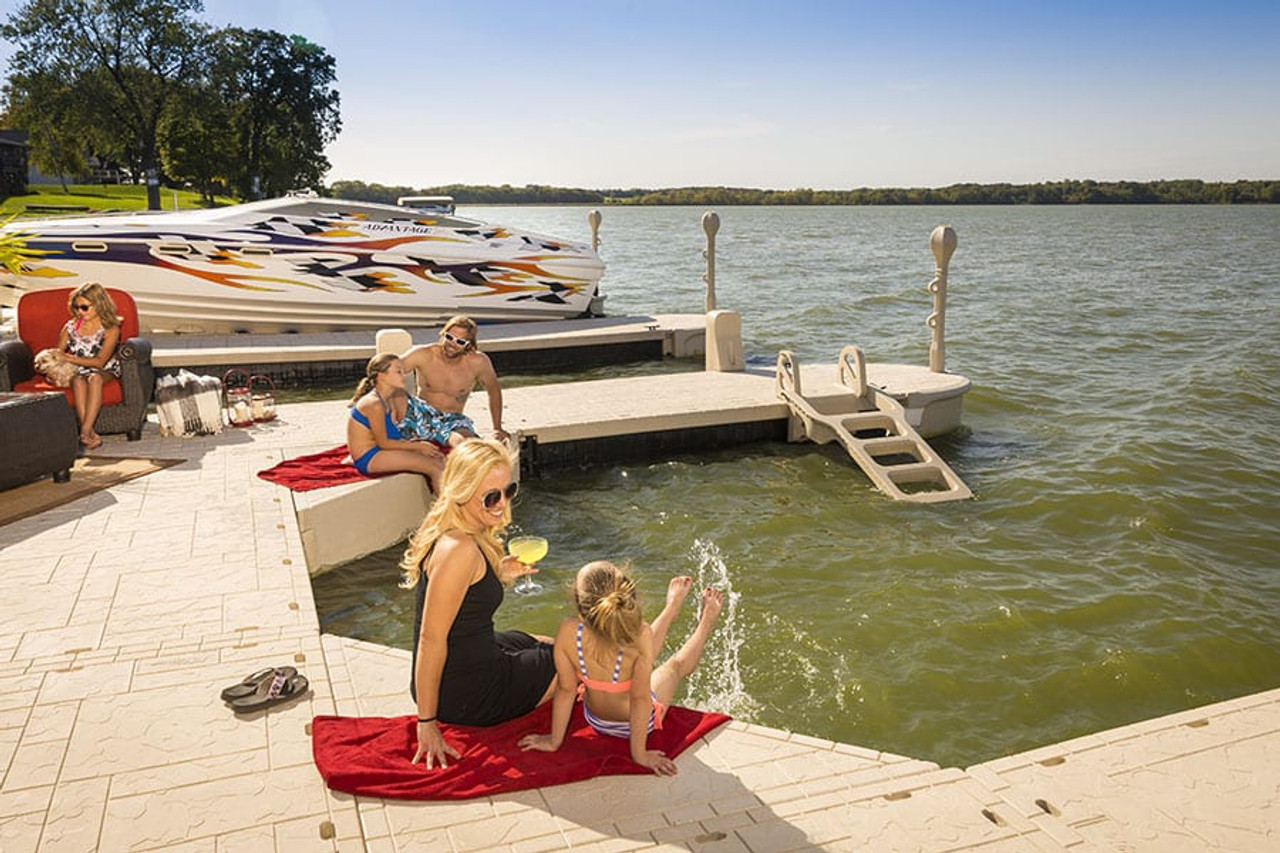The Ultimate Overview to Selecting the Finest Floating Docks
Choosing the excellent floating dock requires a detailed understanding of numerous elements that influence both performance and durability. Variables such as dock types, materials, and vital attributes substantially influence your decision-making process.
Recognizing Floating Dock Types
When selecting a drifting dock, it is vital to comprehend the different kinds offered, as each offers distinctive purposes and applications. Floating docks mostly drop right into three categories: modular, fixed, and pontoon docks.
Modular docks are made up of individual sections that can be quickly set up or reconfigured, making them excellent for changing water degrees and varied uses, such as entertainment tasks or business procedures. Their adaptability enables customization based on specific demands.

Pontoon docks are characterized by their buoyant structure, often made up of multiple pontoons that supply stability and support. They are specifically appropriate for larger vessels and are commonly utilized in marinas or for beachfront buildings. Comprehending these kinds help in selecting one of the most proper floating dock to meet specific requirements, making certain optimal performance and safety.
Trick Materials for Longevity
Selecting the ideal products for floating docks considerably influences their sturdiness and long life. One of the most common materials include timber, plastic, steel, and composite products, each offering distinct advantages and limitations.
Timber, often favored for its aesthetic charm, needs routine upkeep to hold up against dampness and decay. Pressure-treated lumber can enhance resistance to rot, but it may still be susceptible to insects and weathering.

Plastic docks, made of high-density polyethylene (HDPE), are immune to rust, UV radiation, and effect, making them a prominent choice for seaside atmospheres. Their lightweight nature additionally promotes simple installation and moving.
Metal docks, normally built from light weight aluminum or galvanized steel, supply extraordinary strength and durability. They are immune to deterioration, especially when dealt with, however may need additional insulation to stop warm buildup in warm climates.
Composite products, combining wood fibers and plastics, supply the advantages of both timber and plastic, standing up to wetness and fading while calling for marginal upkeep. - floating docks
Ultimately, the selection of products ought to align with environmental conditions, intended use, and upkeep preferences to make sure the floating dock stays useful and aesthetically pleasing gradually.
Crucial Features to Think About
While the selection of materials is important, taking into consideration important functions for floating docks is equally crucial to make certain optimal performance and individual contentment. One key function to examine is the dock's buoyancy ability, which determines just how much weight it can sustain without immersing. floating dock services. This is essential for accommodating watercrafts, personal boat, and also entertainment tasks
In addition, portability is a significant consideration. Depending upon your demands, you might desire a dock that is very easy to disassemble and transfer, specifically if you plan to relocate it seasonally. Stability is one more crucial feature; a well-designed floating dock needs to minimize movement brought on by wind and water currents, giving a protected platform for customers.
Safety attributes, such as non-slip surfaces and rounded edges, are likewise essential to stop mishaps, particularly in damp problems. Moreover, think about the availability site web of devices, such why not try this out as bumpers, ladders, and cleats, which can enhance the functionality of your dock.
Setup and Upkeep Tips
Establishing and preserving a floating dock needs mindful preparation and focus to information to guarantee its durability and optimal performance. Begin by selecting an appropriate location that reduces exposure to solid currents and waves, which can create damage. Ensure that the water deepness is enough for the dock's elevation which it is secured securely to stop motion.
During setup, follow the maker's guidelines carefully, as improper setting up can compromise security. Use high-quality products resistant to deterioration, such as aluminum or dealt with timber, to enhance toughness. Consistently check all components, consisting of drifts, connectors, and anchoring systems, for indications of damage or wear.
Maintenance is crucial for expanding the life of your dock. Clean the surfaces periodically to protect against algae accumulation and check for any type of loose fittings that might require firm. Guarantee they continue to be undamaged and cost-free from punctures if your dock utilizes flotation protection gadgets. In addition, consider applying protective finishes to wood parts to reduce weathering effects. By adhering to these setup and upkeep ideas, you can appreciate a trusted and functional floating dock for many years to find.
Budgeting for Your Dock
Budgeting for your dock is a crucial action the original source that can substantially impact your general satisfaction and investment in a waterfront residential or commercial property. Developing a clear budget plan aids you navigate the different alternatives available and ensures you make educated decisions that straighten with your economic capacities.
Begin by figuring out the size and style of the dock you call for, as these elements will considerably influence the expense. Floating docks can differ substantially in cost, depending on products, buoyancy, and features like ramps and devices. Study different manufacturers and vendors to compare rates and comprehend the market worth.
Along with first expenses, think about continuous expenses such as maintenance, insurance, and potential repair work. Allocate funds for these reoccuring expenses to avoid shocks down the line. It's likewise sensible to allocate any type of necessary authorizations or examinations, which might be called for by neighborhood guidelines.
Last but not least, keep in mind the prospective roi. A tactical dock can enhance your building's worth and charm, providing a positive financial effect in the long-term. By budgeting effectively, you can make sure that your dock meets your needs without compromising your economic security.
Conclusion
In final thought, choosing the suitable floating dock requires an extensive examination of various elements, consisting of dock kinds, materials, important functions, and setup procedures. Cautious factor to consider of financial restrictions will certainly additionally make sure a sound financial investment.

While the selection of products is critical, thinking about vital functions for floating docks is equally important to guarantee ideal performance and individual complete satisfaction.Setting up and maintaining a drifting dock requires cautious preparation and interest to information to ensure its longevity and optimum efficiency. Floating docks can differ substantially in price, depending on products, buoyancy, and attributes like accessories and ramps.In conclusion, picking the excellent floating dock necessitates a detailed analysis of numerous variables, including dock types, materials, crucial attributes, and installation procedures.